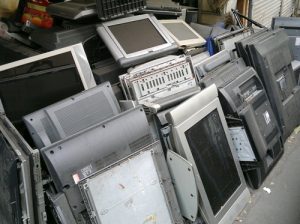 Even if an e-scrap facility is not thought to be processing toxics-emitting devices, it should be testing for toxic substances.
Even if an e-scrap facility is not thought to be processing toxics-emitting devices, it should be testing for toxic substances.

 Colin Staub was a reporter and associate editor at Resource Recycling until August 2025.
Colin Staub was a reporter and associate editor at Resource Recycling until August 2025. Even if an e-scrap facility is not thought to be processing toxics-emitting devices, it should be testing for toxic substances.
Even if an e-scrap facility is not thought to be processing toxics-emitting devices, it should be testing for toxic substances.
 The world’s two largest smartphone brands, Samsung and Apple, shipped fewer devices in 2016 than one year earlier. Continue Reading
The world’s two largest smartphone brands, Samsung and Apple, shipped fewer devices in 2016 than one year earlier. Continue Reading
 China’s recent crackdown on imports of e-scrap and other materials has exposed smuggling operations, led to dozens of arrests and resulted in the confiscation of more than 22,000 tons of material.
China’s recent crackdown on imports of e-scrap and other materials has exposed smuggling operations, led to dozens of arrests and resulted in the confiscation of more than 22,000 tons of material.
 Several years of lagging recovered material totals have led leaders of Oregon’s e-scrap program to slash weight targets for manufacturers beginning next year.
Several years of lagging recovered material totals have led leaders of Oregon’s e-scrap program to slash weight targets for manufacturers beginning next year.
 Public entities continue to take the pledge to become participants in the State Electronics Challenge, indicating their willingness to become better stewards of electronics.
Public entities continue to take the pledge to become participants in the State Electronics Challenge, indicating their willingness to become better stewards of electronics.
 Dell has more than doubled its annual usage of e-plastics collected through its supply chain since beginning the effort two years ago, according to the electronics manufacturer’s 2017 corporate responsibility report.
Dell has more than doubled its annual usage of e-plastics collected through its supply chain since beginning the effort two years ago, according to the electronics manufacturer’s 2017 corporate responsibility report.
 An automated LCD disassembly machine is gearing up to be presented to the public after several years in development.
An automated LCD disassembly machine is gearing up to be presented to the public after several years in development.
 More details have emerged on PC Rebuilders & Recyclers’ bankruptcy case after a summary of the company’s assets and debts was filed in Illinois bankruptcy court this week.
More details have emerged on PC Rebuilders & Recyclers’ bankruptcy case after a summary of the company’s assets and debts was filed in Illinois bankruptcy court this week.
 The largest probe to date of used devices supposedly scrubbed of their data found that 40 percent still retained some amount of personal information.
The largest probe to date of used devices supposedly scrubbed of their data found that 40 percent still retained some amount of personal information.
 User-repair champion iFixit has released four new teardown guides in recent weeks, showing consumers the inner workings of a new set of devices.
User-repair champion iFixit has released four new teardown guides in recent weeks, showing consumers the inner workings of a new set of devices.
